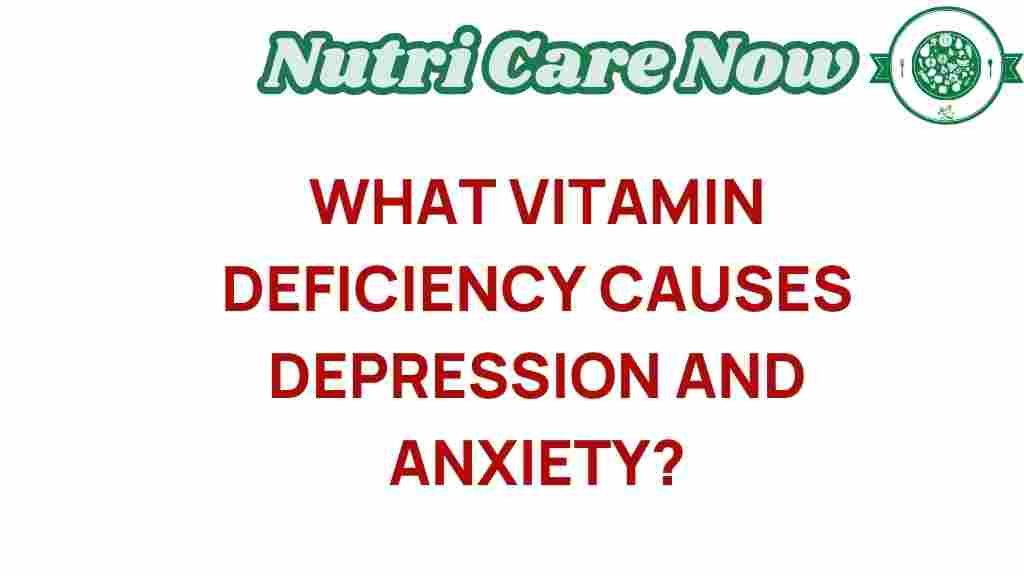Unraveling the Link Between Vitamin Deficiency and Mental Health
Mental health is a complex field influenced by various factors, including genetics, environment, and lifestyle choices. One often overlooked aspect is the role of vitamin deficiency in influencing conditions such as depression and anxiety. This article aims to shed light on how essential vitamins contribute to our mental health and overall wellbeing, and how dietary changes can mitigate some of these issues.
Understanding Vitamin Deficiency
Vitamin deficiency occurs when the body does not receive enough essential vitamins to function optimally. These vitamins are crucial for various bodily processes, including brain function. Common vitamins linked to mental health include:
- Vitamin D
- Vitamin B12
- Folate
- Omega-3 fatty acids
Each of these vitamins plays a unique role in maintaining wellbeing and preventing mood disorders.
The Connection Between Vitamins and Mental Health
Research indicates that vitamin deficiency can lead to or exacerbate mental health issues such as depression and anxiety. Here’s how:
- Vitamin D: Often referred to as the “sunshine vitamin,” vitamin D is crucial for brain health. Low levels of vitamin D have been linked to an increased risk of depression and other mood disorders.
- Vitamin B12: This vitamin is vital for producing neurotransmitters like serotonin, which regulate mood. A deficiency can lead to cognitive decline and increased symptoms of anxiety.
- Folate: Folate deficiency is associated with higher levels of depression. It is essential for DNA synthesis and repair, and its deficiency can lead to alterations in brain function.
- Omega-3 Fatty Acids: These are not vitamins but are crucial for brain health. They help reduce inflammation and are linked to lower risks of depression.
Ensuring adequate intake of these nutrients is essential for maintaining mental health and preventing health conditions associated with mood disorders.
Signs of Vitamin Deficiency
Identifying vitamin deficiency can be challenging as the symptoms often overlap with other health issues. Common signs include:
- Fatigue and lack of energy
- Difficulty concentrating
- Changes in appetite or weight
- Mood swings and irritability
- Sleep disturbances
If you experience these symptoms, it may be time to assess your nutrition and consider dietary changes.
Implementing Dietary Changes to Boost Mental Health
Making dietary changes can significantly enhance your vitamin intake and overall wellbeing. Here’s a step-by-step guide on how to incorporate essential vitamins into your diet:
Step 1: Assess Your Current Diet
Begin by keeping a food diary for a week. Note everything you eat and drink, and look for patterns or gaps in your nutrition. This will help you identify areas where you may be lacking essential vitamins.
Step 2: Educate Yourself on Nutrient-Rich Foods
Once you’ve assessed your diet, research foods rich in the vitamins associated with mental health:
- Vitamin D: Fatty fish (salmon, mackerel), egg yolks, fortified foods (milk, cereals).
- Vitamin B12: Meat, fish, dairy products, fortified plant-based milk.
- Folate: Leafy greens (spinach, kale), legumes (beans, lentils), avocados.
- Omega-3 Fatty Acids: Walnuts, flaxseeds, chia seeds, fish oil supplements.
Step 3: Plan Balanced Meals
Incorporate a variety of these foods into your daily meals. Aim for a balanced diet that includes:
- Fruits and vegetables
- Whole grains
- Healthy fats
- Lean proteins
Consider meal prepping to ensure you have healthy options available throughout the week.
Step 4: Consider Supplements
If you find it challenging to get enough vitamins from food alone, consider taking supplements. However, consult with a healthcare professional before starting any new supplement regimen.
Troubleshooting Dietary Changes
Making dietary changes can be challenging. Here are some troubleshooting tips to help you stay on track:
- Set realistic goals: Aim for gradual changes rather than drastic overhauls.
- Involve others: Share your goals with friends or family for support.
- Experiment with recipes: Find healthy recipes that excite you to make healthy eating enjoyable.
- Track your progress: Keep a journal of your dietary changes and how they affect your mood and energy levels.
Conclusion: The Importance of Nutrition for Mental Wellbeing
In conclusion, the link between vitamin deficiency and mental health is significant. Vitamins play a crucial role in regulating mood and brain function, and deficiencies can lead to serious health conditions such as depression and anxiety. By making informed dietary changes, you can improve your nutrient intake and enhance your overall wellbeing.
For more information on maintaining mental health through nutrition, consider visiting this resource. Remember, if you suspect a vitamin deficiency, it’s always best to consult with a healthcare professional for personalized advice.
Taking care of your mental health is just as important as physical health, and nutrition is a key component of that care. Start your journey towards better mental health today by evaluating your diet and making the necessary changes!
This article is in the category Health and created by NutriCareNow Team
